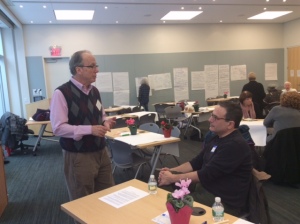by Alice Fisher
February 27, 2015
On Saturday, February 21st, 60 people attended The Radical Age Movement’s “Age Café”, a four-hour workshop on ageism. Based on the organizing process, World Café, the participants had the opportunity to share their stories of ageism with each other and to begin brainstorming on how together we can build a powerful movement that alters how age is dealt with in our society.
When entering the room, attendees found provocative stories and questions about ageism posted around the room to encourage them to think about the ageism stories in their own lives. They then situated themselves at tables for 4. At each table was a member of the The Radical Age Movement’s steering committee to act as facilitator and scribe.
Alice Fisher welcomed everyone and shared her article, What The Radical Age Movement Is and What It’s Not (theradicalagemovement.com/2015/02/18/what-the-radical-age-movement-is-and-what-its-not/ ). She explained that The Radical Age Movement (RA) is not about all of the individual issues that impact the community of older adults, rather it is about exposing the ageism that lies beneath these issues…the exploitation of and prejudice against people merely because of their age. Alice explained to the room, primarily filled with boomers and seniors, that our efforts can also have a significant impact on younger generations who are feeling pressured today to accomplish their life’s work by the time they are forty, before they are “over the hill”. We were so pleased to have several younger people among the participants.
Alice then turned the floor over to Steve Burghardt who was the afternoon’s facilitator. Steve started off the conversations with two questions: What is in your story that brought you to the Age Café today rather than an AARP session on new legislation? and What can we do concretely to confront ageism in our lives and at work? Participants immediately dove into the conversations, sharing their own experiences and observations of the incessant ageism that permeates our society. There was no shortage of ideas for how to confront this last ‘ism’ that eventually affects every single one of us if we are lucky to live long lives.
Throughout the afternoon, participants changed tables where the conversations continued. After several rounds, the scribes from each table reported their observations and notes on the conversations. Some of the comments included:
- Ageism has to emerge as a movement similar to racism, sexism, etc.,
- Women with gray hair are automatically assumed to be grandmas (stereotyping).
- Expressions of discomfort at being offered a seat on the subway (internalized ageism).,
- Workplaces are often set up to be adversarial (young vs. old).
Thoughts on how to confront ageism included:
- Call out ageism wherever you see it, among family and friends, in the media, marketing, etc.,
- Acceptance of ageing starts with ourselves. Be proud of whatever age you are, and “come out” as your age.
- Develop non-alienating responses we can give when confronted with ageist remarks.,
- Examine our own ageist tendencies. (consciousness raising).,
- Develop a public media campaign.
This is only a small sample of the many concerns and suggestions that emerged from an afternoon of conversations about ageism.
Many of Saturday’s participants expressed interest in becoming active in RA. Alice and Steve and the rest of the RA steering committee are already rolling up their sleeves to plan our next steps and reach out to those who want to be involved. To make this work, follow three principles:
- Combat ageism by adding it in to your life and work, don’t add it on;
- Deal with the issues that emerge with consistency, not constancy: this is a long term fight that will requite on-gong effort from us all, not a few weeks that wear everyone out;
- You don’t have to do a lot and you must do a little: new habits of confronting ageism and articulating new ways of thinking and acting about age require small actions over time that committed people commit to—and over time, collectively build to major change.
If people enroll in having a meeting at home or after work that would be great! Little things mean a lot. We extend our gratitude to all of those who participated in the Age Café. Their voices are already serving as a guide as we set off on this significant journey together.





